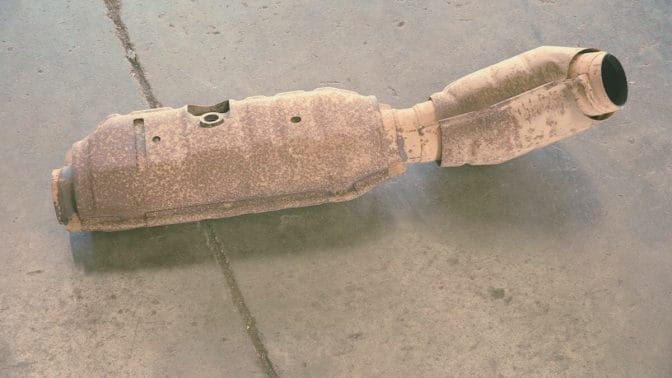Imagine waking up one sunny morning, ready to embark on a long-anticipated road trip in your trusty Prius, only to find your car sitting quietly in the driveway, devoid of its vital catalytic converter. You might wonder, “What drives people to pilfer this essential component?” You’re not alone. Catalytic converter theft has experienced an alarming uptick, particularly among vehicles such as the Toyota Prius, known for its eco-friendliness and fuel efficiency. Let’s delve into the enigmatic world of catalytic converter theft, focusing on Prius cars, and explore the motivations behind these brazen acts.
Understanding the catalytic converter’s role is crucial. Positioned within the exhaust system, this component plays a pivotal role in reducing harmful emissions. It’s instrumental in transforming toxic gases, such as carbon monoxide and nitrogen oxides, into less harmful substances. Despite its modest size, the catalytic converter can be a treasure trove of precious metals like platinum, palladium, and rhodium. These metals’ value on the market often eclipses that of gold, making them hot targets for thieves.
But what makes the Toyota Prius particularly attractive to thieves? One factor is the sheer number of Prius vehicles on the road. Toyota has been a leader in hybrid technology, with millions of Priuses sold globally. The prevalence of these vehicles means that the market for their catalytic converters is robust, further incentivizing criminal circles.
Moreover, the design of the Prius facilitates swift and discreet theft. These converters are easily accessible beneath the vehicle, requiring minimal tools for removal. In many cases, thieves can perform the heist in less than five minutes, often under the cover of darkness. This efficiency makes it an attractive proposition for those considering this illicit endeavor.
Interestingly, the motivation behind catalytic converter theft is not solely financial. While the allure of quick cash remains significant, sociocultural factors often play a role as well. Many individuals turn to theft during economic downturns or financial crises, viewing such acts as a means of survival. The anonymity of the crime can embolden thieves, who may rationalize their actions as a nefarious necessity rather than criminal behavior.
Another dimension to consider is the rise of organized crime in the world of catalytic converter theft. Gangs have established operations that specialize in the acquisition and resale of stolen converters. These groups often utilize sophisticated networks to handle logistics, from stealing the converters to selling them to unscrupulous recyclers. The sheer scale of organized crime adds a layer of complexity to the issue, making it harder for law enforcement to combat the problem effectively.
So, what can you do to mitigate the risk of catalytic converter theft? Enlightenment is your first line of defense. Many car owners remain blissfully unaware of the vulnerability of their vehicles. Educating yourself about the risk factors and preventive measures can help safeguard your prized possession. Simple strategies can include parking your Prius in well-lit, high-traffic areas, using motion-sensitive lights, or, even better, employing a catalytic converter lock. This locking mechanism can deter potential thieves, making it more challenging for them to access your converter quickly.
Utilizing a vehicle identification number (VIN) etching can also be a wise decision. By engraving your VIN onto the catalytic converter, you make it traceable. This practice not only serves as a deterrent but can also aid law enforcement in identifying stolen parts and returning them to their rightful owners. Furthermore, incorporating technology into your car security measures can prove beneficial. GPS trackers and alarms can provide an added layer of protection, alerting you to any unauthorized access attempts.
Let’s not overlook the importance of community awareness and involvement. Neighborhood watch programs can be incredibly effective in combating not only catalytic converter theft but a range of criminal activities. By fostering a spirit of vigilance among community members, you can establish a network that keeps an eye out for suspicious behavior, thereby creating a safer environment for all.
In addition to community action, local law enforcement agencies can play a pivotal role. By collaborating with police departments, community members can advocate for targeted patrols in high-risk areas, ensuring that officers are alert to the signs of potential theft. Moreover, supporting and promoting educational initiatives aimed at raising awareness about catalytic converter theft can galvanize collective action against this issue.
Your car is more than just a mode of transportation; it’s an investment and often an extension of your identity. Understanding the underlying motivations behind catalytic converter theft, especially in relation to Prius cars, helps frame the broader discussion about vehicle security and personal safety. As thieves continue to adapt and find new targets, taking proactive steps and fostering community engagement will be paramount in thwarting their nefarious efforts. The quest for car security isn’t merely a battle against crime; it’s about preserving the peace of mind that comes with owning a reliable vehicle.
In contemplating the question of why people steal catalytic converters from Prius cars, we uncover layers of economic motivation, sociocultural influences, and the role of organized crime. Addressing this complex issue requires a multifaceted approach—one that combines awareness, technological solutions, community involvement, and law enforcement partnership. By taking these steps, we can work together to combat catalytic converter theft and protect our vehicles from such brazen acts.
